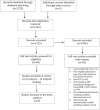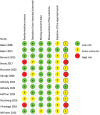A systematic review of behavioural smoking cessation interventions for people with severe mental ill health-what works?
- PMID: 34697848
- PMCID: PMC9298065
- DOI: 10.1111/add.15724
A systematic review of behavioural smoking cessation interventions for people with severe mental ill health-what works?
Abstract
Background and aims: People with severe mental ill health smoke more and suffer greater smoking-related morbidity and mortality. Little is known about the effectiveness of behavioural interventions for smoking cessation in this group. This review evaluated randomized controlled trial evidence to measure the effectiveness of behavioural smoking cessation interventions (both digital and non-digital) in people with severe mental ill health.
Design: Systematic review and random-effects meta-analysis. We searched between inception and January 2020 in Medline, EMBASE, PsycINFO, CINAHL, Health Management Information Consortium and CENTRAL databases.
Setting and participants: Randomized controlled trials (RCTs) assessing the effects of behavioural smoking cessation and reduction interventions in adults with severe mental ill health, conducted in any country, in either in-patient or community settings and published in English.
Measurements: The primary outcome was biochemically verified smoking cessation. Smoking reduction and changes in mental health symptoms and body mass index (BMI) were included as secondary outcomes. Narrative data synthesis and meta-analysis were conducted and the quality of included studies was appraised using the risk of bias 2 (RoB2) tool.
Findings: We included 12 individual studies (16 articles) involving 1861 participants. The first meta-analysis (three studies, 921 participants) demonstrated effectiveness of bespoke face-to-face interventions compared with usual care across all time-points [medium-term: relative risk (RR) = 2.29, 95% confidence interval (CI) = 1.38-3.81; long-term: RR = 1.58, 95% CI = 1.09-2.30]. The second (three studies, 275 participants) did not demonstrate any difference in effectiveness of bespoke digital on-line interventions compared with standard digital on-line interventions (medium-term: RR = 0.87, 95% CI = 0.17-4.46). A narrative overview revealed mixed results when comparing bespoke face-to-face interventions with other active interventions. The methodological quality of studies was mixed, with the majority having some concerns mainly around risk of selective reporting.
Conclusions: Face-to-face bespoke smoking cessation interventions for adults with severe mental ill health appear to be effective when compared with treatment as usual, but evidence is equivocal when compared with other active interventions. There is limited evidence comparing bespoke digital interventions with generic interventions, and we found no studies comparing them with usual treatment.
Keywords: Bipolar disorder; psychosis; quit smoking; schizophrenia; severe mental illness; smoking cessation.
© 2021 The Authors. Addiction published by John Wiley & Sons Ltd on behalf of Society for the Study of Addiction.
Figures




Similar articles
-
Strategies to improve smoking cessation rates in primary care.Cochrane Database Syst Rev. 2021 Sep 6;9(9):CD011556. doi: 10.1002/14651858.CD011556.pub2. Cochrane Database Syst Rev. 2021. PMID: 34693994 Free PMC article.
-
Electronic cigarettes for smoking cessation.Cochrane Database Syst Rev. 2022 Nov 17;11(11):CD010216. doi: 10.1002/14651858.CD010216.pub7. Cochrane Database Syst Rev. 2022. Update in: Cochrane Database Syst Rev. 2024 Jan 8;1:CD010216. doi: 10.1002/14651858.CD010216.pub8. PMID: 36384212 Free PMC article. Updated.
-
Mindfulness for smoking cessation.Cochrane Database Syst Rev. 2022 Apr 14;4(4):CD013696. doi: 10.1002/14651858.CD013696.pub2. Cochrane Database Syst Rev. 2022. PMID: 35420700 Free PMC article.
-
Electronic cigarettes for smoking cessation.Cochrane Database Syst Rev. 2021 Sep 14;9(9):CD010216. doi: 10.1002/14651858.CD010216.pub6. Cochrane Database Syst Rev. 2021. Update in: Cochrane Database Syst Rev. 2022 Nov 17;11:CD010216. doi: 10.1002/14651858.CD010216.pub7. PMID: 34519354 Free PMC article. Updated.
-
Smoking cessation in severe mental ill health: what works? an updated systematic review and meta-analysis.BMC Psychiatry. 2017 Jul 14;17(1):252. doi: 10.1186/s12888-017-1419-7. BMC Psychiatry. 2017. PMID: 28705244 Free PMC article.
Cited by
-
Effectiveness and Adherence of Pharmacological vs. Non-Pharmacological Technology-Supported Smoking Cessation Interventions: An Umbrella Review.Healthcare (Basel). 2025 Apr 21;13(8):953. doi: 10.3390/healthcare13080953. Healthcare (Basel). 2025. PMID: 40281901 Free PMC article. Review.
-
Interventions for smoking cessation in inpatient psychiatry settings.Cochrane Database Syst Rev. 2024 Sep 4;9(9):CD015934. doi: 10.1002/14651858.CD015934. Cochrane Database Syst Rev. 2024. PMID: 39229858 Free PMC article.
-
A network approach to lifestyle behaviors and health outcomes in people with mental illness: the MULTI+ study III.Eur Psychiatry. 2025 Apr 11;68(1):e53. doi: 10.1192/j.eurpsy.2025.2442. Eur Psychiatry. 2025. PMID: 40211776 Free PMC article.
-
Clearing the smoke: experiences of patients and professionals during a one-year smoking cessation intervention in ambulatory mental healthcare - a qualitative study.Subst Abuse Treat Prev Policy. 2025 Jul 25;20(1):29. doi: 10.1186/s13011-025-00663-9. Subst Abuse Treat Prev Policy. 2025. PMID: 40713742 Free PMC article. Clinical Trial.
-
The detrimental effects of smoking on the course and outcome in adults with bipolar disorder-A narrative review.Front Psychiatry. 2023 Jan 9;13:1114432. doi: 10.3389/fpsyt.2022.1114432. eCollection 2022. Front Psychiatry. 2023. PMID: 36699491 Free PMC article. Review.
References
-
- Correll CU, Solmi M, Veronese N, Bortolato B, Rosson S, Santonastaso P, et al. Prevalence, incidence and mortality from cardiovascular disease in patients with pooled and specific severe mental illness: a large‐scale meta‐analysis of 3,211,768 patients and 113,383,368 controls. World Psychiatry. 2017;16:163–80. - PMC - PubMed
-
- Osborn DPJ, Levy G, Nazareth I, Petersen I, Islam A, King MB. Relative risk of cardiovascular and cancer mortality in people with severe mental illness from the United Kingdom's general practice research database. Arch Gen Psychiatry. 2007;64:242–9. - PubMed
-
- Royal College of Psychiatrists (RCP) . Smoking and Mental Health: A Joint Report by the Royal College of Physicians and the Royal College of Psychiatrists. London, UK: RCP; 2013.

